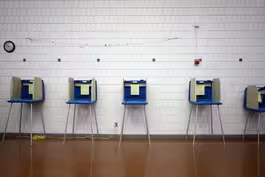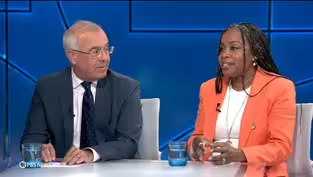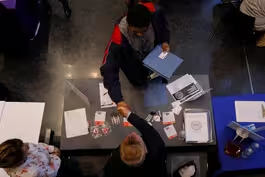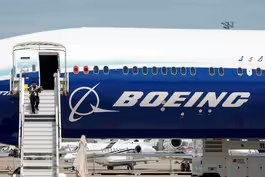
The challenges new British PM Keir Starmer faces
Clip: 7/5/2024 | 6m 43sVideo has Closed Captions
The challenges Keir Starmer faces as the new U.K. prime minister
After winning a huge majority in Britain’s general election, Labour Prime Minister Keir Starmer says he’ll start working immediately on rebuilding the country. He promised a big reset to calmer waters after 14 sometimes turbulent years of Conservative government. The Conservatives are looking for a new leader after Rishi Sunak resigned. Special correspondent Malcolm Brabant reports from London.
Problems playing video? | Closed Captioning Feedback
Problems playing video? | Closed Captioning Feedback
Major corporate funding for the PBS News Hour is provided by BDO, BNSF, Consumer Cellular, American Cruise Lines, and Raymond James. Funding for the PBS NewsHour Weekend is provided by...

The challenges new British PM Keir Starmer faces
Clip: 7/5/2024 | 6m 43sVideo has Closed Captions
After winning a huge majority in Britain’s general election, Labour Prime Minister Keir Starmer says he’ll start working immediately on rebuilding the country. He promised a big reset to calmer waters after 14 sometimes turbulent years of Conservative government. The Conservatives are looking for a new leader after Rishi Sunak resigned. Special correspondent Malcolm Brabant reports from London.
Problems playing video? | Closed Captioning Feedback
How to Watch PBS News Hour
PBS News Hour is available to stream on pbs.org and the free PBS App, available on iPhone, Apple TV, Android TV, Android smartphones, Amazon Fire TV, Amazon Fire Tablet, Roku, Samsung Smart TV, and Vizio.
Providing Support for PBS.org
Learn Moreabout PBS online sponsorshipAMNA NAWAZ: After winning a huge majority in Britain's general election, new labor Prime Minister Keir Starmer says he will start working immediately on rebuilding the country.
He promised what he called a big reset after 14 sometimes turbulent years of Conservative government.
The defeated Conservatives are looking for a new leader after Rishi Sunak resigned as he left office.
Special correspondent Malcolm Brabant reports from London.
(CHEERING AND APPLAUSE) MALCOLM BRABANT: Seconds after voting ended, exit polls confirmed that Sir Keir Starmer had led the Labor Party to one of its greatest ever parliamentary victories and that he was heading to 10 Downing Street.
KEIR STARMER, British Prime Minister: People here and around the country have spoken, and they're ready for change, to end the politics of performance, a return to politics as public service.
MALCOLM BRABANT: This was the worst election result in the Conservative Party's history.
Rishi Sunak, Britain's first prime minister of color, managed to hang on to his district in Northern England, while many of his colleagues were wiped out.
After 14 years of Conservatism ended, with most people being poorer, voters took their revenge.
But Sunak was dignified in defeat.
RISHI SUNAK, Former British Prime Minister: To the country, I would like to say, first and foremost, I am sorry.
I have given this job my all, but you have sent a clear signal that the government of the United Kingdom must change.
MALCOLM BRABANT: Despite the size of Labor's majority, this is being described as a loveless landslide; 40 percent of the electorate abstained, and Labor only managed to obtain a third of the total vote.
Most experts agree that Britain wanted to teach the Conservatives a lesson, and that this is not an overall endorsement of Labor or Keir Starmer.
MAN: Sir Keir Starmer, Your Majesty.
MALCOLM BRABANT: The choreography of British elections requires the monarch to invite the winner to form the next government.
And after his audience with the king, Starmer addressed the nation.
He was magnanimous in victory and offered an olive branch to those who hadn't voted for Labor.
KEIR STARMER: Whether you voted Labor or not, in fact, especially if you did not, I say to you directly, my government will serve you.
Politics can be a force for good.
We will show that.
We have changed the Labor Party, returned it to service, and that is how we will govern, country first, party second.
MALCOLM BRABANT: Starmer's political experience has been in domestic politics.
But now he has to step up to the international stage and become the new face of the so-called special relationship with the United States.
Starmer has talked about an early recognition of Palestine as a state.
He's also less hawkish about China.
Evie Aspinall is director of the British Foreign Policy Group, based in an art gallery.
She sees potential trouble ahead.
EVIE ASPINALL, Director, British Foreign Policy Group: Israel-Palestine could certainly prove to be a challenging point of contention between the U.K. and the United States.
I think also China would increasingly be a source of contention as well.
So there are definitely some potential bumps in the road.
If Trump wins in the United States as well, I think that will prove even more challenging.
Keir Starmer and Joe Biden have a lot in common, but Keir Starmer and Donald Trump don't have a huge amount in common.
So I think the next few years could be particularly challenging for the U.K.-U.S. relationship.
MALCOLM BRABANT: Britain's new foreign secretary is David Lammy, who says Aspinall, is going to have to learn the language of diplomacy.
EVIE ASPINALL: Lammy will have a lot of work to do to kind of rebuild relationships with Trump if he does win.
They have already been doing quite a lot of that.
They have been working quite hard to kind of win over Republican support particularly and those they think will be close to Trump if Trump wins.
So, it's already in motion.
They will be doing a lot to kind of show that actually there are areas of common ground.
MALCOLM BRABANT: Another change in Britain's foreign policy is going to be over Europe.
Relations between E.U.
capitals in London have been strained since Brexit and the hostile language of successive Conservative administrations.
Starmer wants closer ties to try to boost trade and improve agreements over security and immigration.
But Jill Rutter, a European specialist at the Institute for Government, is skeptical about the potential for success.
JILL RUTTER, Senior Fellow, Institute for Government: Keir Starmer has made clear that we're not applying to rejoin the E.U., nor are we applying to join the single market or the customs union, but he does want to improve the relationship with Europe.
He wants to have closer cooperation on foreign policy and defense, and he wants to try and improve what he refers to as Boris Johnson's botched Brexit deal.
The interesting question is whether there's much appetite in the E.U.
for doing that.
MALCOLM BRABANT: Another major foreign policy issue is Ukraine, whose flag flies high above buildings in Whitehall, London's government district.
Britain has led European solidarity with Kyiv.
Foreign policy expert Evie Aspinall says that will continue under Starmer.
EVIE ASPINALL: Ukraine remains a top priority for Keir Starmer, as it has been for Rishi Sunak.
In the U.K., there's kind of bipartisan support for U.K. leadership in supporting Ukraine in the invasion.
So that's across the board, defense, aid, et cetera, migration as well.
I don't see any big substantive change coming on the U.K.'s policy on Ukraine.
MALCOLM BRABANT: On the home front, Britain's divisions are exemplified by the result in Worthing West on England's South Coast.
Labor's Beccy Cooper, a public health doctor, managed to defeat the longstanding Conservative incumbent, Sir Peter Bottomley, but only because the reform candidate, Edmund Rooke, attracted so many votes from disaffected Conservative supporters.
Across the country, Reform, an anti-immigrant party, led by Donald Trump's ally Nigel Farage, secured 13 per cent of the overall vote.
But because of the electoral system, Reform only won five seats.
Farage will be one of the loudest opposition voices in Parliament.
What sort of prime minister do you think he's going to be?
NIGEL FARAGE, Reform Party Leader: Boring.
Very, very boring.
(LAUGHTER) NIGEL FARAGE: I mean, he's got -- I mean, there's nothing.
There's no flair.
He's Blair without the flair.
That literally is what he is.
MALCOLM BRABANT: Despite his majority in Parliament, Keir Starmer is unlikely to enjoy a honeymoon period.
He told Britain to vote for change.
But Britain is impatient.
It expects him to deliver soon.
For the "PBS News Hour," I'm Malcolm Brabant in London.
Ballot drop boxes legal again in Wisconsin after ruling
Video has Closed Captions
Clip: 7/5/2024 | 4m 8s | Ballot drop boxes legal again in Wisconsin after state Supreme Court ruling (4m 8s)
Brooks and Atkins Stohr on Biden's vow to stay in the race
Video has Closed Captions
Clip: 7/5/2024 | 12m 6s | Brooks and Atkins Stohr on Biden's vow to stay in the race for the White House (12m 6s)
Jobs report shows signs of a cooling labor market
Video has Closed Captions
Clip: 7/5/2024 | 6m 28s | Jobs report exceeds expectations but unemployment rise signals cooling labor market (6m 28s)
What Boeing's plea deal could mean for the aviation industry
Video has Closed Captions
Clip: 7/5/2024 | 10m | What Boeing's potential fraud plea deal could mean for the aviation industry (10m)
Providing Support for PBS.org
Learn Moreabout PBS online sponsorship
- News and Public Affairs

FRONTLINE is investigative journalism that questions, explains and changes our world.

- News and Public Affairs

Amanpour and Company features conversations with leaders and decision makers.












Support for PBS provided by:
Major corporate funding for the PBS News Hour is provided by BDO, BNSF, Consumer Cellular, American Cruise Lines, and Raymond James. Funding for the PBS NewsHour Weekend is provided by...



